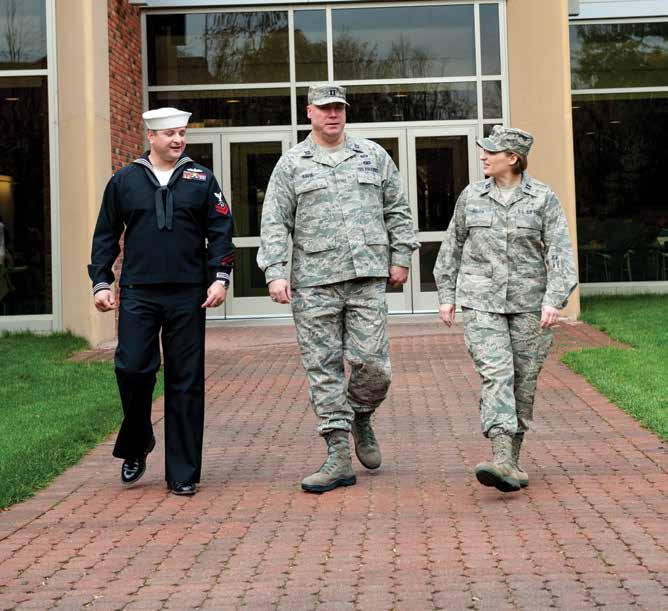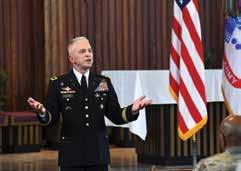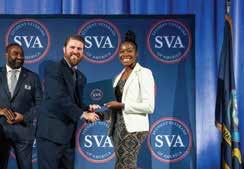
11 minute read
SELFLESS SERVICE
From campus to combat zones to the Pentagon itself, Bethel’s military-affiliated students and alumni lead and serve as selfless ambassadors for Christ.
by Katie Johnson ’19 and Jenny Hudalla ’15 design by Kristi Ellison ’10

Chaplain John Morris S’86 has counseled and comforted others in the rain, under the stars, on the back of military tanks, and even while jumping out of a plane. The retired Army colonel has dedicated his life to creating a welcoming space for military-affiliated personnel—close to home and around the world. “As a chaplain, I had to be where they were,” he says. “It’s not about them coming to find me. It’s getting out, being with the people you serve, and learning to love them. You gotta get your rucksack on and walk with them.”
Now the executive director of Bethel’s Office of Military and Veteran Services, Morris has brought his rucksack to campus. He helps military-affiliated students embrace their humanity after experiencing combat, adjust to life at home after deployment, and pursue their goals in the military or beyond. When he talks with prospective students about the educational benefits associated with the GI Bill, he often explains, “You have a lot of options, so why not pick the best?”
For Morris, the best is Bethel. Since taking the helm of the Office of Military and Veteran Services last year, he has seen departments across the university support military-affiliated students in a significant way. The financial aid office has streamlined its processes to accommodate various military benefits, and the registrar’s office applies military training as credits toward completion of a degree program. Professors have volunteered to attend seminars on how to best serve military-affiliated students in the classroom, and the Wellness Center offers personalized physical training. Thanks in part to Morris’ efforts, Bethel is designated as both a Yellow Ribbon school and a military-friendly institution.
These things matter to Morris because he considers militaryaffiliated students first-class citizens. “These people signed a blank check with the country, guaranteeing that they would lay their lives down if needed,” he says. He knows firsthand how Bethel can influence these students, and he witnesses how these students influence Bethel. “Veterans lift the community to the next level, and military members challenge the community to selfless service— because they’re already doing it.”
Morris “gets it” because he has lived the life of a soldier. He has been to combat three times, saw some of the worst fighting in Iraq, and has served everywhere from the front of a congregation to the heart of the Pentagon, where he was an actions officer for the U.S. Army chief of chaplains. When he attended Bethel Seminary, he experienced what he calls a “world-class education” fitting for military-affiliated personnel who want to be challenged academically and grow in their faith.
“I always tell young soldiers, ‘Don’t come to Bethel if you don’t want to work hard,’” Morris says. “‘You’re going to be known and valued here, but you are not going to be coddled. The student-faculty ratio is small so you can get life breathed into you. The professors here will love you. They will pray for you. The Christ-centeredness here is not a slogan. It’s a reality. You cannot help but be impacted by the Christian community here—for the better.’”

Here, meet Bethel students and alumni who—like Morris—are serving others honorably and selflessly, here and around the world.
Caring for the Soul of the Army
In his youth, Tom Solhjem S’88 was, by his own description, a rebellious kid who was angry and hurt by his parents’ divorce. He used drugs, got kicked out of public school, and eventually joined the Army—not because of any noble aspirations, he says, but because he needed to get away.
The Army as it was then didn’t solve his problems. His risk-taking behavior increased, as did his drug use, and he became suicidal. He hit bottom quite literally when, in a drug-induced state, he fell from a four-story barracks. And that’s when God showed up—in the form of the sergeant first class medic who treated him. “This man saw my pain, and he listened to me,” Solhjem says. “As our friendship developed, I saw him praying and reading his Bible. At one point, we talked all night, and


in the morning I knelt at my bunk and gave my life to God.”
The medic referred Solhjem to a chaplain from Minnesota who became a life-changing source of support, encouragement, and mentoring. Then Solhjem prayed a fateful prayer. “I didn’t want to be in the Army,” he says. “But I prayed for God to call me to whatever He wanted—even if that was being a chaplain.”
Not long after, Solhjem moved to the Twin Cities to attend Bible college, and by his senior year he began exploring options for graduate education. Bethel Seminary, with its diversity in perspective, drew his attention. “At Bethel, you’re in a community with others who are not like you,” he says. “You learn to respect different theological backgrounds; you gain a broader understanding of people of faith. Real formation is in the rub with others.”
Solhjem has served as a chaplain for 31 years, 17 of those with Special Operations, where it was “an honor and privilege to serve with our finest,” he says. He’s served more than five and a half years in combat, an assignment he embraces as part of the calling. “Being in combat is what you train for,” he says, “to be there to inspire and to tend wounds, both physical and spiritual. Chaplains share the hardships of those we serve and are there, if necessary, to give up our lives in that service.”
Today, Solhjem serves at the Pentagon as the U.S. Army chief of chaplains, where he advises the most senior leaders of the world’s greatest fighting force—a global enterprise that includes 6,000 Chaplain Corps members serving 1.5 million soldiers and civilians and 4.6 million family members. “The Army exists for one reason,” he says. “To protect our freedom and win our nation’s wars. And U.S. Army chaplains have been called to care for the soul of that Army for 244 years.”
The man who didn’t want to be in the Army is now the spiritual leader for the entire U.S. Army, an irony that does not escape him. Today’s Army is not the Army it was in the 1970s, and Solhjem is not the man he was then, either. “I have seen God do so much that I can’t take credit for,” he says. That includes his personal journey of transformation—a journey that led him from the brink of suicide to a place where he is ready and willing to live out his life in service to others, and, if called upon to do so, give up his life for the sake of others.
Choosing Actions That Change the World
In her youth, Cassandra Dixon ’20 moved 13 times. Her family immigrated from Liberia 25 years ago, and of her five brothers and three sisters, Dixon is the first to be born in the U.S. Her parents encouraged each of their children to be great in their own way, and for Dixon, greatness took the form of service—for her country and the hurting people living within it.
By the time she graduated from high school in 2016, Dixon knew she wanted to be a doctor. She explored her options to fund the many years of school ahead, and enlisting in the Army National Guard seemed the most viable— until she received an Act Six scholarship, a full-tuition leadership award that prepares students to impact their urban communities. Dixon no longer needed to join the military to pay for school, but she

decided to enlist anyway because she believed there was value in the challenge of military training. “If I could do basic training, I could do anything,” she says.
Basic training proved to be just the right fit for Dixon. She loved the camaraderie as her unit strived toward goals together. She pursued advanced individual training as a culinary specialist and now serves in that role with the National Guard one weekend each month. Because basic training overlapped with the fall semester, she started at Bethel mid-year, and found the transition challenging.
But then Dixon met John Morris, executive director of military and veteran services, on one of his first days at Bethel. He noticed how she carried herself and asked about her military training. “From the beginning, he has encouraged my leadership and my belief in myself,” Dixon says. “His influence has inspired me.”
Dixon in turn has inspired others. To support other military-affiliated students, she formed a Student Veterans of America (SVA) chapter at Bethel last year. She attended an SVA leadership training in Washington, D.C., in September 2019, and in January 2020, she represented Bethel at the SVA National Convention in Los Angeles. The sense of community built by these strong connections has provided a support that Dixon says is unique to Bethel. “There’s a genuine love here,” she says. “I don’t know if you get that anywhere else.” That love has become increasingly real to her as she continues to actively grow in her faith. “I’ve noticed a huge change over my time at Bethel,” she says. “I’m growing, finding out who I am, and finding out for myself who God is.”
In addition to her militaryaffiliated connections, Dixon has developed a community of fellow Act Six scholars. Act Six is more than just programming, she says. Instead, “it’s a group of students who share the same vision,” she explains, “who are actively choosing actions that can help change their communities and the world.” That sense of empowerment motivates Dixon. She takes this opportunity seriously, noting that each decision has the potential to make a difference. Rather than focusing on what she can’t do, Dixon considers the full extent of her potential impact. “Who can I inspire with my choices and actions?” she wonders. “Who am I going to inspire by being who I am?”

Visit bethel.edu/militaryveteran-services to learn more about resources for Bethel’s military-affiliated community.
Ryan Singh ’21 Biokinetics and biology double major Retired Air Force diagnostic imaging quality control manager and section supervisor
Singh supervised military and civilian personnel on an X-ray and fluoroscopy floor and inspected radiological images for quality control. He hopes to use the communication, leadership, and relational skills he learned through both his military and Bethel experiences to become a doctor. “It’s important for Christians to be represented in the military because of our compassion and servant mentality to those around us, not only in the U.S. but internationally as well,” he says. “The military gives us a unique platform to be profound ambassadors for Christ, allowing His message to be heard and felt from all corners of the world without discrimination.”

Conor Nordmeyer ’21 History and biblical and theological studies double major Army National Guard Sergeant and religious affairs specialist
During a 10-month deployment in Kuwait his junior year, Nordmeyer assisted and advised the chaplain and commander to ensure troops were able to practice their religions. He completed administrative duties for Sunday services and also served as battalion historian for Division Headquarters and Headquarters Battalion. He helped administer suicide prevention training, which encourages soldiers to become more comfortable talking about mental health and to interact with other soldiers who may be struggling with depression or thoughts of suicide. “I wouldn’t be here at Bethel without the military, and I don’t think I’d be where I am today without Bethel,” he says. “Both put me in a position that has really helped me develop myself.”
Jonathan Eliason ’92 Biology major Retired Air Force surgeon; current professor and vascular surgeon at University of Michigan
Eliason spent more than four months in 2006 and 2007 deployed in Balad, Iraq, at the former Iraqi National Air Force Base with the U.S. Air Force during Operation Iraqi Freedom. Along with performing more extensive, open surgeries, he was part of a team exploring how to bring minimally-invasive surgeries to a combat zone. After his time in the military, he helped develop a life-saving catheter used for soldiers and trauma victims. “During my time at Bethel, the personal investment, the opendoor policy, the obvious love and care that were poured into me—I can’t put a price tag on that,” he says. “It was so valuable, and I know Bethel has remained that way.”
Jana (SunDheim) Nohrenberg ’95 Nursing major U.S. Army Colonel and Chief Nursing Officer at Landstuhl Regional Medical Center, Germany
Nohrenberg directs nursing practice to ensure patient care and clinical and staffing standards meet regulatory requirements for five Army Health Clinics across Belgium, Germany, and Italy. She also oversees primary and specialty healthcare provided by more than 3,200 personnel to over 209,000 beneficiaries. “Bethel ensured that I had the fundamental baseline knowledge to be a professional nurse,” she says. “Coursework in leadership and management set the foundation for skills that I would build upon and develop over the past 25 years as an Army officer. Bethel’s Christ-centered approach ensured that I had the life skills, resiliency, and moral foundation to help me as a leader and in my own personal life.” BU






